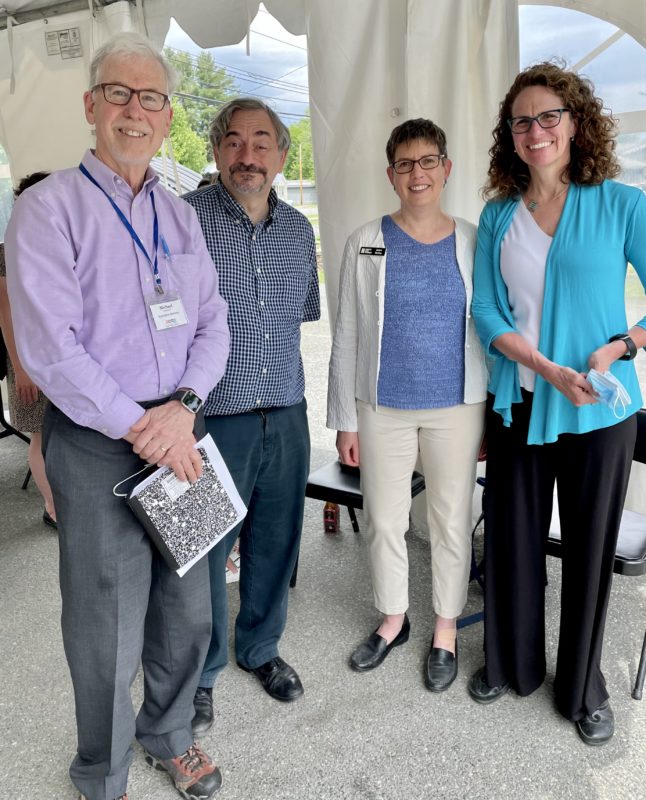
Media Release
For Immediate Release: June 8, 2021
Contact: Michael Redmond
Executive Director
Upper Valley Haven
713 Hartford Avenue
White River Junction, VT 05001
mredmond@uppervalleyhaven.org
(802) 478-1802
Upper Valley Haven Hosted Hunger Free America, Legislators, and Local Anti-Hunger Organizations to Discuss Lessons Learned from Pandemic and What It Will Take to Truly End Hunger
White River Junction, Vermont – On June 3, 2021, Joel Berg, CEO of national anti-hunger organization, Hunger Free America, visited the Upper Valley Haven, along with leaders from Hunger Free Vermont and New Hampshire Hunger Solutions, Congressman Peter Welch (D-VT), and staff from the offices of Senator Bernie Sanders (I-VT) and Congresswoman Annie Kuster (D-NH) to highlight the continued impact of the Covid-19 crisis on low-income families struggling with food insecurity in the Upper Valley and beyond. Speakers shared data highlighting ongoing community-based hunger relief, and pending legislative efforts at the state and federal levels for universal school meals, eliminating the SNAP “Thrifty Food Plan” which provides woefully inadequate levels of food support to needy families, and raising the minimum wage, to end hunger.
Mr. Berg visited the Upper Valley Haven as part of a coast-to-coast journey this summer, connecting with nonprofit organizations working to bring food to communities in need as well as to bring an equitable and lasting end to hunger. He noted, “Even with the pandemic easing, hunger still ravages virtually every rural and suburban town and urban neighborhood in the nation—including through Vermont and New Hampshire—which is why I am traveling across the country to meet with those working on the front lines of hunger and resilient families facing food hardship from coast-to-coast. My goal is to energize the work to enact the public policies needed to end U.S. hunger once and for all.”
The economic impact of the Covid-19 pandemic continues to affect low-income households that were already struggling with poverty and hunger before the health crisis. One in three people in Vermont experienced food insecurity in the past year as measured by University of Vermont research. The risk of hunger doubled for families with children, and for Black, Indigenous, and people of color. The hunger recovery in Vermont and New Hampshire could take years unless state and federal governments take bold action. Anore Horton, Executive Director of Hunger Free Vermont, noted in her remarks to the assembled audience, “We must never ‘go back’ to the systems that created our norms because normal is unacceptable with rates of 1 in 10 people facing hunger. Federal policies enacted during the pandemic, including increasing 3SquaresVT (SNAP) and WIC benefit levels, and allowing for universal school, summer, childcare, and afterschool meals, must become a ‘new normal.’”
Laura Milliken, Executive Director of NH Hunger Solutions, reported that in March 2021, New Hampshire ranked 47th in the nation in school breakfast participation and 39th in SNAP participation. She said, “Our children’s opportunity for health and nutrition shouldn’t be dependent on where they live. The disparities between New Hampshire and Vermont tell us that the strategies we’ve had in place to address hunger have failed to solve the problem, either over time or even acutely during crises. We know what works—consistent universal school meals, access to sufficient SNAP, WIC and other benefits to fill the gap for those facing economic hardship and to stimulate local economies—we just need the support to bring those strategies to scale and make them permanent.”
Michael Redmond, Executive Director of the Upper Valley Haven, added, “The Haven is proud of our programs to share nutritious food to Vermont and New Hampshire communities throughout the pandemic. But charity food is not the answer to ending hunger. National policies, regulations and funding for programs that increase incomes, result in more buying power like SNAP and WIC, and provide meals for every student are needed now.”
“The Upper Valley Haven has been a critical resource and a frontline provider to so many struggling Vermonters throughout the pandemic,” said Congressman Welch. “It was great to join Joel Berg to highlight the incredible work of our local organizations and advocates. As we reopen our towns and rebuild our communities, we need to make sure that no one falls through the cracks. In Congress, I will continue to fight for expanded SNAP benefits and other resources to help more Vermont families get the food they need during and after the pandemic.” In a shared statement Congresswoman Kuster added, “This is a critical moment for our communities as we survey the effects of an unprecedented health and economic crisis. […] Moving forward, we must do more to address the root causes of hunger and food insecurity.” Erica Campbell, an aide to U.S. Sen. Bernie Sanders, I-VT, told the crowd that Sanders has reintroduced the universal school meals bill that would provide free meals for all students. The bill, which received little support when it was first introduced two years ago, now has multiple co-sponsors and support from organizations across the country, Campbell said “This is the time,” she added.
# # #
About the Upper Valley Haven: With the support of the Upper Valley community, the Haven assists those who are experiencing poverty to be free from hunger, to be securely housed, to pursue a self-directed life, and to reach their full potential. The Upper Valley Haven provides temporary shelter, housing navigation, community outreach and service coordination for families and adults experiencing homelessness and poverty, afterschool and summer camp programs for children affected by the trauma of homelessness, and food to anyone in need. The Haven is open 365 days per year, never charges for any of its services, and serves over 14,500 people annually from both Vermont and New Hampshire. In addition to delivery of needed services, the Haven is focused on solutions through community development and advocacy at local, state, and national levels.

